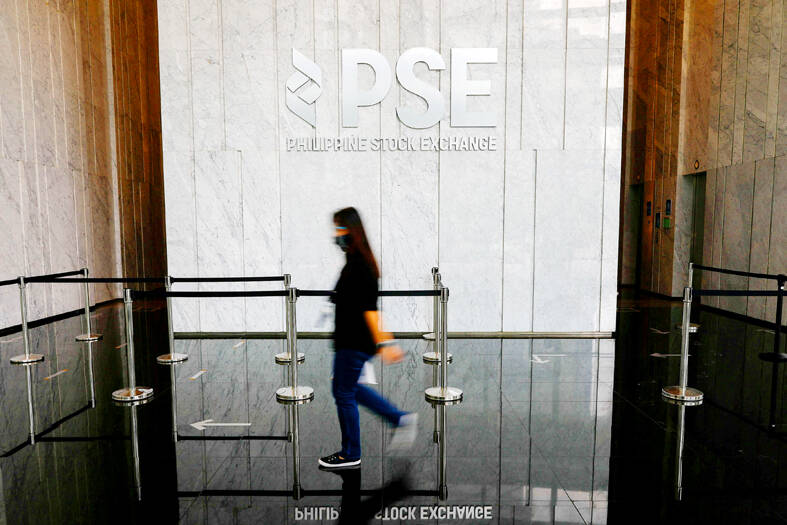Philippine stocks yesterday fell for a fifth day, pushing the nation’s benchmark index into a bear market, amid concern over potential global headwinds and disappointing domestic economic data.
The nation’s benchmark equity gauge slid to the lowest level in more than two years as the prospect of higher US tariffs threatened by US President Donald Trump damped the optimism of global equity investors. A government report published on Thursday showed the local economy grew slower than analysts expected, hurt by sluggish investment, consumption and farm output.
“The bout of continuing weakness is likely being underpinned by the lack of a positive catalyst,” said Rastine Mackie Mercado, an analyst at Chinabank Securities Corp in Manila.

Photo: Reuters
Investors are also awaiting the release of fourth-quarter and full-year company’s earnings reports, he said.
The Philippine Stock Exchange Index slipped 4 percent yesterday to 5,862.59, more than 20 percent below its October high, and the lowest closing level since October 2022. Volumes climbed during the selloff, with 138.8 million shares changing hands, the highest daily turnover in four months.
The nation’s GDP rose 5.2 percent last quarter from a year earlier, the statistics agency said on Thursday. That fell short of the 5.5 percent median estimate in a Bloomberg survey and matched the 5.2 percent pace for July to September.
Full-year growth at 5.6 percent also missed the adjusted government target of 6 percent to 6.5 percent and the 5.8 percent forecast by economists. On quarter, the expansion was slower than estimated at 1.8 percent.
Philippine Finance Secretary Ralph Recto said the government remains “optimistic” about its outlook for this year.

In Italy’s storied gold-making hubs, jewelers are reworking their designs to trim gold content as they race to blunt the effect of record prices and appeal to shoppers watching their budgets. Gold prices hit a record high on Thursday, surging near US$5,600 an ounce, more than double a year ago as geopolitical concerns and jitters over trade pushed investors toward the safe-haven asset. The rally is putting undue pressure on small artisans as they face mounting demands from customers, including international brands, to produce cheaper items, from signature pieces to wedding rings, according to interviews with four independent jewelers in Italy’s main

Japanese Prime Minister Sanae Takaichi has talked up the benefits of a weaker yen in a campaign speech, adopting a tone at odds with her finance ministry, which has refused to rule out any options to counter excessive foreign exchange volatility. Takaichi later softened her stance, saying she did not have a preference for the yen’s direction. “People say the weak yen is bad right now, but for export industries, it’s a major opportunity,” Takaichi said on Saturday at a rally for Liberal Democratic Party candidate Daishiro Yamagiwa in Kanagawa Prefecture ahead of a snap election on Sunday. “Whether it’s selling food or

CONCERNS: Tech companies investing in AI businesses that purchase their products have raised questions among investors that they are artificially propping up demand Nvidia Corp chief executive officer Jensen Huang (黃仁勳) on Saturday said that the company would be participating in OpenAI’s latest funding round, describing it as potentially “the largest investment we’ve ever made.” “We will invest a great deal of money,” Huang told reporters while visiting Taipei. “I believe in OpenAI. The work that they do is incredible. They’re one of the most consequential companies of our time.” Huang did not say exactly how much Nvidia might contribute, but described the investment as “huge.” “Let Sam announce how much he’s going to raise — it’s for him to decide,” Huang said, referring to OpenAI

The global server market is expected to grow 12.8 percent annually this year, with artificial intelligence (AI) servers projected to account for 16.5 percent, driven by continued investment in AI infrastructure by major cloud service providers (CSPs), market researcher TrendForce Corp (集邦科技) said yesterday. Global AI server shipments this year are expected to increase 28 percent year-on-year to more than 2.7 million units, driven by sustained demand from CSPs and government sovereign cloud projects, TrendForce analyst Frank Kung (龔明德) told the Taipei Times. Demand for GPU-based AI servers, including Nvidia Corp’s GB and Vera Rubin rack systems, is expected to remain high,